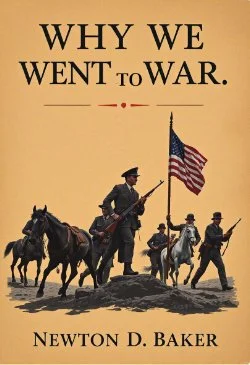By Newton D. Baker, Edited by Ciolin Heston
Newton Diehl Baker’s Why We Went to War, published in 1921, is one of the most important contemporary American explanations of the nation’s entry into the First World War. Baker, who served as Secretary of War from 1916 to 1921 under President Woodrow Wilson, occupied a unique position at the very center of America’s wartime transformation. Once known as a progressive mayor of Cleveland and a disciple of Wilsonian reform, Baker became, almost overnight, the chief administrator responsible for raising, training, and mobilizing an army that grew from a modest peacetime force into one of the most formidable fighting powers of the modern age. His book represents both a justification and a reflection—part political defense, part historical testimony—on why the United States took the fateful step of joining a conflict from which it had long sought to remain apart.
For modern readers, Why We Went to War should be approached both as a primary document and as an act of persuasion. Baker was not an impartial historian; he was a participant and advocate, a defender of Wilsonian ideals at a moment when those ideals were under attack. His words reveal not only the official reasoning of the Wilson administration but also the mindset of a generation of progressives who believed that the United States, through sacrifice and leadership, could help reorder the world toward democracy and peace.
In the end, Baker’s book is as much about America’s identity as about the Great War. It reflects a moment when the nation stood at the crossroads between its traditional reluctance to become entangled in European affairs and its emerging role as a world power. To understand why the United States entered World War I is to understand not only the international provocations of the time but also the ideals, anxieties, and ambitions of a nation coming of age on the world stage.
Read-Me.Org Inc. New York-Philadelphia-Australia. 2025. p. 165.





